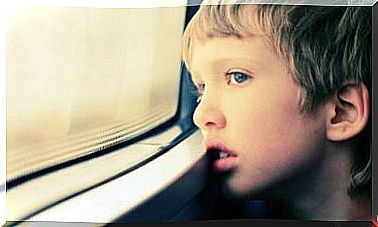Being The Mother Of A Child With Attention Difficulties

In the middle of the 21st century, we are used to being constantly exposed to a large amount of information that is completely irrelevant to our survival. The little ones in our society have to learn, from the earliest years of life, to live with various flashy stimuli that can make them lose attention and concentration. Consequently, it is not difficult to realize that it is increasingly common to be the mother of a child with attention difficulties.
These mothers need to make an extra effort to be able to understand and support their child, seeking the information they need to be able to properly meet all their needs.
What are attention difficulties?
When a child has significant and disabling attention difficulties, they are said to have Attention Deficit Disorder. It is a developmental disorder that represents a persistent pattern of behavior, characterized by inattention, disorganization and the possible appearance of hyperactivity and impulsivity.

According to the fifth edition of the Diagnostic and Statistical Manual of Mental Disorders (DSM-5), for a diagnosis of attention deficit to be confirmed, the child must present at least six of the following symptoms of inattention for a period of at least six months and frequent:
- He does not pay enough attention to detail and makes mistakes in his schoolwork due to neglect.
- Has difficulty maintaining attention while performing playful or recreational tasks or activities.
- When spoken to directly, he doesn’t seem to listen.
- He does not follow instructions received and does not complete schoolwork.
- Has difficulty organizing tasks and activities.
- Avoid, are annoyed, or are unenthusiastic about undertaking tasks that require sustained mental effort.
- Loses things necessary for carrying out tasks or activities.
- He is easily distracted by irrelevant stimuli.
- Forget or neglect daily activities.
Being the mother of a child with attention difficulties
There are many mothers today who have children with attention difficulties, but there is no need to be alarmed. We must limit ourselves to accepting the situation and helping the little one in his daily life, putting into practice a series of simple educational and pedagogical rules, so that the little one can face his own problems and have a correct developmental development.
Strategies for helping your child
Difficulties with attention and disorganization can cause the child to be unable to continue with their tasks, or to seem not to listen or to constantly lose objects. This type of action can contribute to the appearance of various problems of:
- Learning.
- Behavior.
- Social skills.
If you have a child with attention difficulties, you need to help him alleviate these problems by following a series of rules, such as those described in the following lines.

On the one hand, a fundamental measure that must be taken is to create a structured and orderly environment in the home in which the child can follow certain routines and habits. On the other hand, it is necessary to offer him games and activities that stimulate his concentration, such as:
- Puzzle.
- Stories.
- Labyrinths.
- Building blocks.
- Word search patterns.
Likewise, when the time comes to talk to him, ask him a request or give him an order, you need to employ clear and direct communication. For this purpose, it is worthwhile:
- Call the child by his name when he is near and address him looking him in the eye and adopting a gentle tone of voice.
- Explain the instructions clearly and precisely. If necessary, ask him to repeat what was said, to verify that he understood it correctly.
- Use short, direct sentences and give instructions one at a time, without contradictions.
- When requests arise, keep a cautious distance and avoid physical contact.
Finally, it is important to note that when the little one performs his duties and demonstrates good behavior, positive reinforcement must be applied, through the use of compliments, hugs, kisses or any affective gesture. In this way the child will feel satisfied and will probably repeat the desired behaviors again.









